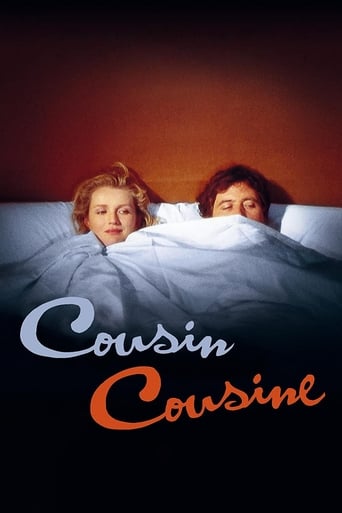

Retrospectively speaking, this French comedy's dark horse success mainly can be attributed to the fact that it opportunely corresponds with the sex liberation trend in the 1970s, not just a commercial hit in its homeland, it also has conquered the audience in North America, entering Oscar's BEST FOREIGN LANGUAGE FILM race, and most absurdly, it even procures two other nominations BEST ORIGINAL SCREENPLAY, and BEST LEADING ACTRESS for Barrault. Why it is absurd? Simply because it is one of those out-of- the-blue nominations in Oscar's history which don't make any sense to even be encompassed as the fillers among the year's best. COUSIN COUSINE is about two cousins by marriage, Marthe (Barrault) and Ludovic (Laloux), she is married to a philandering Pascal (Marchand) and they have a teenage son, whereas he is in his second marriage with Karine (Pisier) and has a teenage girl from his first marriage. The film blithely opens with the wedding of Marthe's mother Biju (Garcin), the new husband is Ludovic's uncle, Marthe and Ludovic meet for the first time and they gradually grow a platonic affinity while Pascal and Karine enjoy a brief fling on which they turn a blind eye. Labelled as a Gallo farce with its radical anti-monotony feel-goodism, the film is not parsimonious to ridicule all its supporting characters as a mean to attest that the click between two soul-mates cannot be bridled by common shackle of marriage or morality, and quite obviously, the platonic slogan cannot sustain too long in a French romance. Still, Director and co-writer Jean-Charles Tacchella steadily presents their inappropriate relationship through the prism of family gatherings, a wedding first, a funeral follows, then another wedding and the film ends on Christmas eve, each time Marthe and Ludovic become more and more intimate, meanwhile, Pascal and Karine's senses of jealousy and exasperation become more and more comical to behold.Granted, one cannot speak ill of the nonchalant attitude and freewheeling spontaneity of the film's core romance, Barrault and Lanoux register convincing chemistry through the journey, sauntering with tacit rapport, sharing a knowing smile, revelling in their first-time copulation in a hotel, or bathing together; while facing their respective nuclear families, they never sink to awkward evasions or flagrant lies to their spouses or stage a scene to befit their own benefit.Guy Marchand occasions most of the buffoonery as a deplorable womaniser cannot overcome the blatant adultery of his wife, the only threatening moment comes when he fiddles with a pistol, but indeed he is really not that gruesome kind, he is vengeful truly, but not homicidal. Marie-France Pisier comes off appreciably as a jittery trophy wife who is much interested in her sleep therapy than her husband, openly admits she doesn't mind Ludovic's affair, but to really assimilate the facts and convey a healing process, it is another pair of shoes for her.Overall, this light-hearted relationship comedy is a run-of-the-mill novelty from 70s, actually it has spawned a Hollywood remake COUSINS (1989) by the very prosaic Joel Schumacher, and as expected, the rehash is a much more forgettable offering. However Tacchella's career has already hit its crest in his second feature and all his luck runs off since then, he retires permanently in 1999.
... View MoreDanielle Thompson, one of the most consistent high quality screenwriters in late twentieth century French cinema, still had another fourteen years until she turned hyphenate (writer-director) when she wrote this charmer in 1975. Unmistakenly Gallic - other countries have attempted the basic premise succeeding only in snatching suet puddings from the jaws of souffles - it's lighter-than-air treatment of a heavy subject is note perfect not only in the two central performances but also in the wry portraits of their extended families beginning with their respective spouses and children and working outwards. Watching it for the first time some thirty-seven years after it hit the salles I was totally captivated by it's charm, dispensed via an eye-dropper and its overall enchantment.
... View MoreIf you have a playful sense of humor and enjoy films with an early Fellini (celebration of life-quirky characters) flavor, you should make it a point to watch "Cousin Cousine". Released in 1975, on the surface this is just an off-beat love story about two middle-aged "cousins-by marriage" who are drawn to each other by a shared playfulness. These kindred spirits awaken in each other a zestful and irreverent attitude toward life that distances them from their large (and somewhat strange) extended family. They want to experience as much of life as possible, the man has made it a practice to change professions (not just jobs) every three years so that nothing gets stale. They are very open about their affair, reasoning that the rest of the family will think the worst anyway. Not surprisingly their affair also distances them from their respective spouses, who do not share their fun-loving and irreverent attitudes.The lovers are played by Christine Barrault (nominated for an Oscar) and Victor Lanoux. Although they are fun and likable characters, most of the comedy in this film emanates from the performances of the actors who play their respective spouses. Guy Marchand plays Barrault's husband as a cranky and pathetic Cassanova whose philandering lifestyle is cramped by his inability to cope with his wife's sudden infidelity. Marie-France Pisier, as Lanoux's neurotic airhead wife, subtly steals each scene in which she appears; when a character introduces themselves with the revelation that the only time they have ever been happy was during hypnotherapy, you know that interesting moments are ahead. And for what it is worth Pisier is breathtakingly beautiful.The affair causes the Marchand and Pisier characters a great deal of pain for most of the film, but by the end they have pretty much adjusted to everything. Marchand has resumed his pursue of other women and Pisier has returned to her main source of pleasure-therapy. Marchand's regeneration occurs with his first playful moment, he mounts a knife (fake) in his back and staggers into the living room to the shock of the assembled relatives. While Pisier's regeneration is the best scene of the film. Alone and fully clothed in the bathroom, she half-heartedly tries to slit her wrist with a razor blade and falls backward into the empty tub, which she unexpectedly finds a pleasant and relaxing place to think. And how appropriate since the bathtub is a device we associate with privacy, purgation, relaxation, openness, and regeneration.They say that all films are political and "Cousin Cousine" is no exception. Films have the power to deconstruct the traditional values of society and this love story is also a social commentary on the hypocrisy and double-standards of 1970's western middle class culture. And while pointing out these issues it offers psycho-political messages that each viewer can relate to personally and specifically. The theme is that each day should be a celebration of life, experience, and growth.The grandfather is shown as someone whose long life has given him a real perspective. He is pleased when his teenage granddaughter reveals that she has discovered sex and found it to be wonderful, delighted that she has found something see finds wonderful and amused because her joy is so contrary to the nihilism she had been embracing. He is self-sufficient, the widowed grandmother from the other side of the family enjoys being with him but realizes that he is perfectly comfortable and prefers living alone. He is disturbed by the failure of the family to take any significant time from their lives to mourn his brother's passing.The strange antics of the adults in this extended family are a source of great amusement to the observant children. The carnival music score gives the many extended and flowing group shots a pleasing circus side-show attraction flavor.Note how the film opens with one of families driving to the wedding; parents in the front seat, brother and little sister in the back seat. The parents are agitated and scolding, the children calm and attentive to the experience of the moment. They go out of the scene with the little sister sliding over to be closer to her brother and smiling in adoration. The same little observant girl appears in close-up periodically throughout the film, smiling in amusement at the antics of everyone around her. The film ends with the little girl smiling serenely out the window as she watches the lovers leave on their motorcycle.
... View MorePleasant romantic comedy about French social mores with Barrault and Lanoux starring as cousins - by marriage - who first become friends who eventually fall in love. They finally have an affair, flaunting it beautifully to their entire family. Some early development of farce, but not taken far enough, although there is a wonderful funeral sequence where everyone seems preoccupied with other things, rather than a deceased member of the family. (Pascal incessantly looking at his watch; the children assuming the funeral is another party.)Great performances from Barrault and Lanoux highlight the fun. Barrault and the film were Oscar nominated in 1975.
... View More